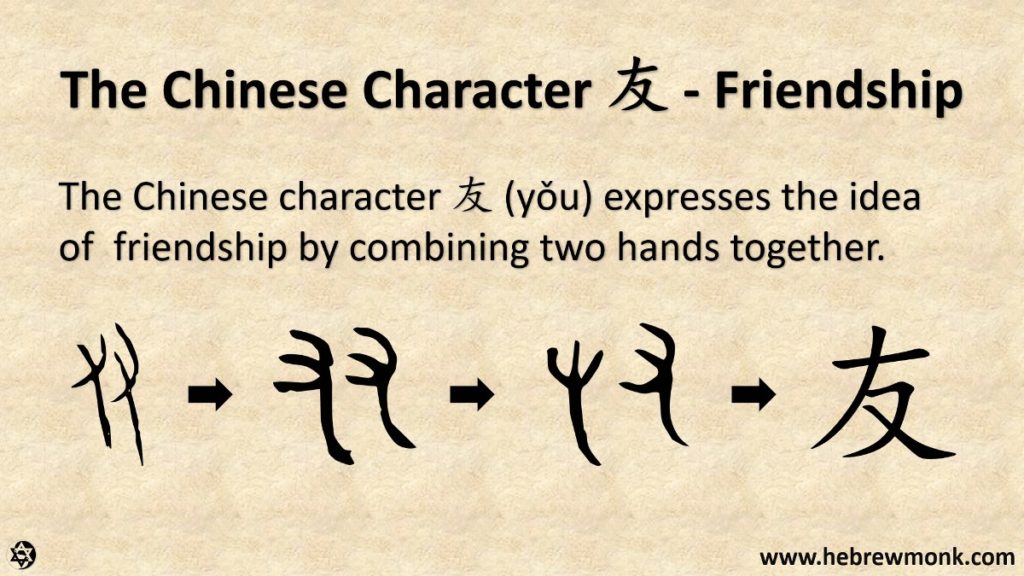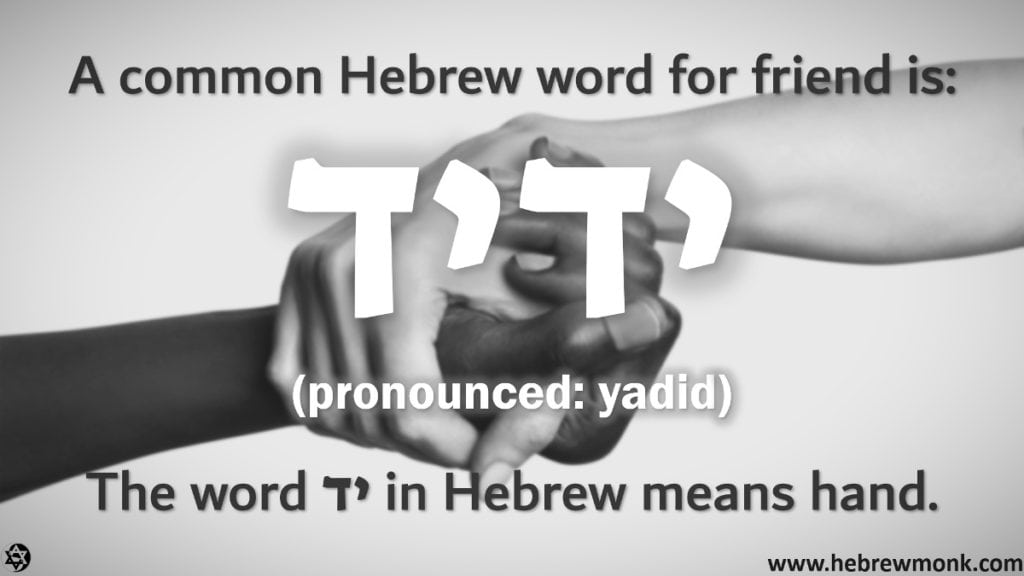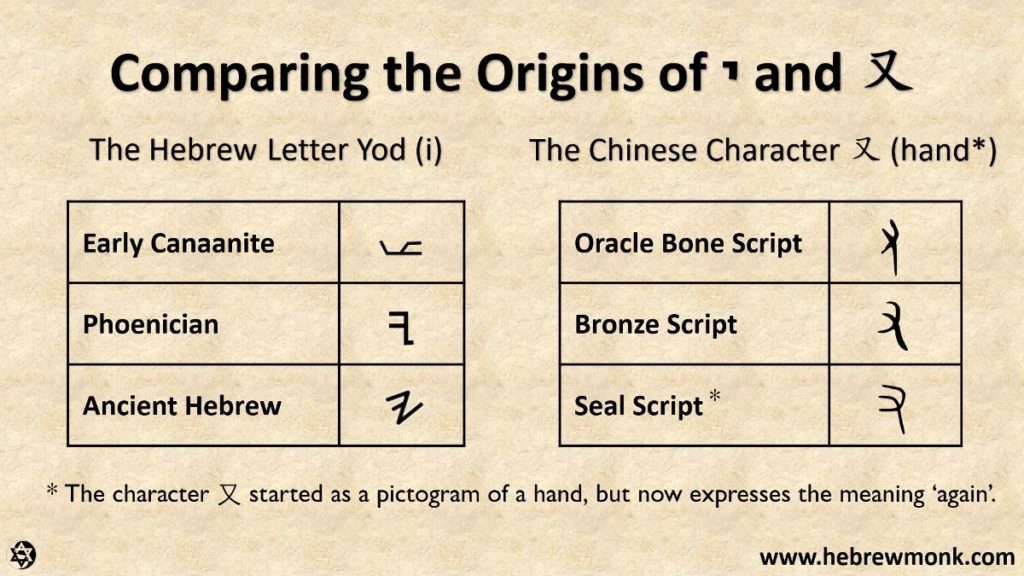Meet the Chinese character for friendship. It is written 友 and pronounced yǒu in standard Mandarin Chinese (sounds more like ‘yo’ than ‘you’). Though it is not so easy to see it today, this character was originally a pictograph of two hands.

Since shaking hands as a form of greeting probably was not a thing when Chinese characters were created, it is quite likely that this character expressed the meaning of friendship through the concept of cooperation, working together and mutual help.
The character 友 is a part of the word 朋友 (péng you) which is how you say friend in Chinese. Therefore, you learn it quite early, usually within the first couple of weeks. When I came across it in my Chinese studies, I remember thinking to myself: “Chinese is so cool! How come we don’t have such things in Hebrew?”. As it turns out, I was wrong…
There are two common ways to say ‘friend’ in Hebrew. The most common one is חָבֵר (chaver) which is based on the shoresh ח-ב-ר (Chet-Bet-Resh). The basic meaning of this shoresh is to connect, to join or to add up and it can also be found in the word חֶבְרָה (chevra) meaning company or society, the word תַּחְבִּיר (tachbir) meaning syntax (the way you join words to form a sentence), and even תַּחְבּוּרָה (tachbura) which means transportation (connecting different places). However, this is not the word I want to talk about today.
I want to talk about the word יָדִיד (yadid), which also means friend but is considered to be more formal and literary in Modern Hebrew. Notice something unusual about this word? Look closer! It consists of two instances of the word יָד (Yad) which means hand in Hebrew.

Now before you get all excited and start telling everyone Hebrew and Chinese are related or something, we should note that these are not two hands per se. The second י (Yod) is simple there because of the Mishqal of the word and to indicate the full Chiriq and the ‘ee’ sound. However, this does not mean that Hebrew didn’t apply the same “manual” logic as Chinese did.
The Shoresh of the word יָדִיד (yadid – friend) is י-ד-ד (Yod-Dalet-Dalet) which is also the basis for the noun יְדִידוּת (yedidut) meaning friendship, its derivative adjective יְדִידוּתִי (yediduti) which means friendly, and the verb הִתְיַדֵּד (hityaded) – to become friends or to form bonds of friendship.
There are two possible origins for the Shoresh י-ד-ד (Yod-Dalet-Dalet). The first one is the primal root י-ד (Yod-Dalet) and the word יד (yad) which means hand. As we have already seen in the post Buried in the Sand, duplicating the final letter of a primal two-letter root was common practice. As for the Mishqal of the word ידיד (yadid – friend), its most common use is to express applicability, so maybe the idea here was that it was safe to extend one’s hand and that the gesture will be well received.
The second possible origin for the shoresh י-ד-ד (Yod-Dalet-Dalet) is the primal root ד-ד (Dalet-Dalet) which expresses fondness and kinship. It is also found in the word דּוֹד (dod) which in Modern Hebrew means uncle, but in Ancient Hebrew could also refer to any kind of beloved person. The name David (דָוִד or דָוִיד) is believed to have also stemmed from this root.
It is also worth mentioning here that the primal root ד-ד (Dalet-Dalet) is also connected to the word דַּד (dad) which means udder or teat (note the similarity between the DD and TT sound). It really brings to mind the English term bosom friend, doesn’t it?
In any case, I am more inclined to believe it all started with the word יד (yad – hand), but maybe it is my background in the Chinese characters that skews my judgement.
Regardless of whether the word ידיד (yadid – friend) comes from the primal root י-ד (hand) or not, the mere presence of the letter Yod is in itself a possible remnant of a hand. Take a look at the evolution of the letter Yod, and also note the resemblance to the hand radical 又 found in the Chinese character 友 (friendship):

The original shape of the letter Yod is not the only indication it has evolved from a drawing of a hand. Another strong addition to the case is the name Yod itself which still bears much resemblance to the word יד (yad – hand).
By the way, the sound of the name Yod is also preserved in the Greek letter Iota and in many Germanic languages with the letter Jot. Though the name of the letter J completely changed in English, we still have the word ‘jot’ which shares its origin with Yod and Iota, as both of them are smallest and simplest letter in the Hebrew and Greek alphabets respectively.
The three types of friends in Modern Hebrew
Modern Hebrew speakers in Israel have found a creative use for the words יָדִיד (yadid – male friend) and יְדִידָה (yedida – female friend). Whenever some choses this term to refer to someone else (usually a member of the opposite sex), rather than חָבֵר (chaver) for a guy or חֲבֵרָה (chavera) for a girl, it usually means he or she want to be very clear they are “just friends” and there’s nothing going on between them – neither romantically nor sexually.
For cases when there is something going on sexually but not romantically, we have the slang words יָזִיז (yaziz) and יְזִיזָה (yeziza). They describe a partner for casual sex and as you can see, they were created by replacing the letter Dalet with the letter Zain in the words ידיד (yadid) and ידידה (yedida). The letter Zain was chosen because it is also a common and vulgar way to refer to a man’s penis, and because its name shares the same root as the verb זִיֵן (ziyen), which in the past meant to arm or to provide weapons, but now is simply a vulgar word which means to f##k.
Out of the three common ways to say friend in Modern Hebrew, the word ידיד (yadid) stands for the one person who is not getting any. And there is yet another connection to the use of hand for you…;-)
Stay in Touch!
Get the next post from Hebrew Monk directly to you inbox!
Don't like emails? Subscribe to Heberw Monk's Telegram Channel instead.

